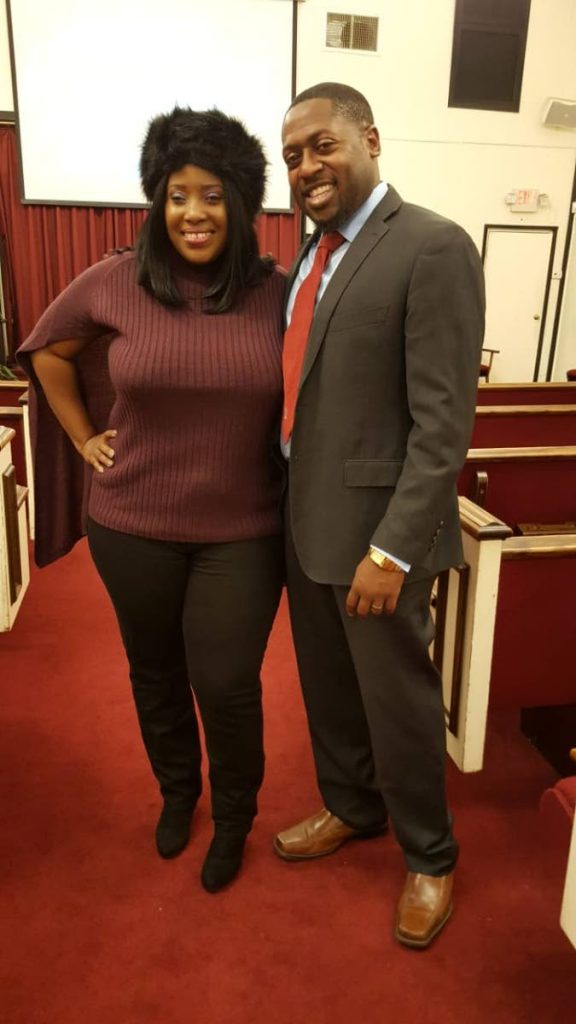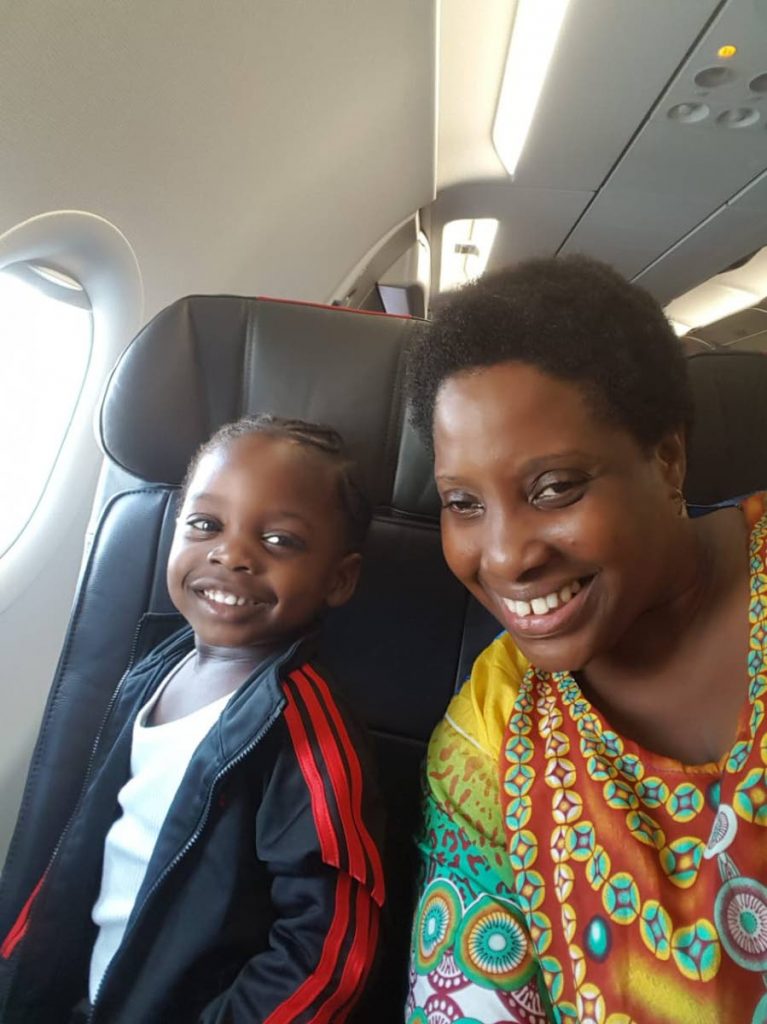Quweina in progress

QUWEINA ROBERTS has been accepted to the renowned Clemson University in South Carolina, USA, to do her PhD in International Family and Community Studies (IFCS). She would leave her homeland in early August.
Roberts has a BSc in Business Administration with a Minor in Human Resource Development from Florida Memorial University (Miami - 2007) and a Masters in Strategic Leadership and Management from the University of the West Indies (St Augustine - 2014).
Roberts is married and has a three-year-old son. Asked how her pursuance of even higher education will affect her immediate family she said, “My husband is a US citizen and resident of New Jersey and will be joining me in South Carolina for the duration. Our son however, will remain in Trinidad with my family. This was an extremely difficult decision and each day I question whether or not we are doing the right thing, but my faith in God is unwavering.
My mother raised four children on her own and I am confident she will continue the amazing job she always did. She will also have support and assistance from “our village”. My siblings, aunts, uncles and close friends form part of my “tribe” and they will provide a helping hand when necessary. The sacrifice will be well worth it. Our son, will visit during the vacation breaks. The price of progress!”
Roberts is the daughter of Valerie Green and the late Aldwyn Roberts, better known in the calypso world as the Grandmaster, Lord Kitchener, who still holds the record for the most road marches titles in TT to date.

Roberts currently holds the post of citizens’ facilitation manager at the Office of the Prime Minister (OPM). She explained: “The Citizens’ Facilitation Unit (CFU) under the auspices of the prime minister works closely with other ministries and government agencies to ensure that all citizens receive the care and protection necessary in meeting all basic needs required for socially-just levels of well-being. Such well-being would encompass social, economic, psychological, spiritual and medical spheres.
“Unfortunately my contractual period will cease on departure. This is somewhat heart-breaking because I love what I do to support the prime minister and I believe in his vision for a better Trinbago. The ability to serve the people without special rewards or favours brings contentment and it’s a humbling experience. Public service is about having a passion for people empowerment, without prejudice.”
Roberts was offered a full Graduate Research Assistantship (GA) which comes with a tuition waiver because of her extensive research and work done in community, social, family and youth development.
Asked how she felt about getting the GA, she said it is a blessing, since she had initially applied to First Citizens Bank for a school loan but was unsuccessful in securing the amount requested.
Robert said she then thought about deferring her studies until she could secure the loan, but one day her department chair, Dr Mark Small contacted her while he was in the Czech Republic with news of a possible external grant to run a mentorship programme for at-risk youth in South Carolina. She said: “It required several Skype interviews and a grant proposal. I knew it was highly competitive, but I am resolute in my faith. At the very last minute, five days before the international student requirement deadline, I was offered the GA with a tuition waiver. God is awesome!”
In addition to the tuition waiver, Roberts will also be paid a monthly stipend to administer the externally-funded programme assigned to her, the Momentum Bike Clubs.
She said the Momentum Bike Clubs is premised on the belief that children with multiple risk factors, including persistent poverty, parental incarceration, and/or instability in home life, are more likely to thrive when they live in communities that are inclusive and supportive of them and their caregivers. Unfortunately, too often the opposite is true she said. “When families struggle with multiple challenges, they often become increasingly isolated within community settings. Children may have academic difficulties or other behavioural problems. Often they carry tremendous burdens as they cope with their families’ struggles. I look forward to developing the framework to assess the social and economic impact of this programme.”
The three-year doctoral programme in IFCS is designed to educate professionals to generate, diffuse and apply knowledge needed to strengthen communities’ capacity for family support, meaningful participation and strong relationships. With its focus on family and community life, the programme touches on the most fundamental aspects of people’s everyday lives. Blending the humanities, the social sciences and various professional disciplines, the programme is unique in its integration of normative analysis, empirical research, and community development.
Roberts said, “With a foundation in the study of human rights as applied to children and families around the world, the programme builds a comparative understanding of US, foreign and international law and policy on child and family issues and of the significance of democracy for the well-being of individuals, families and communities.
Such studies provide the foundation for an understanding of the principles and practices of community development and transformation, humanitarian assistance and responsive human services. The important role and features of effective informal mutual assistance mechanisms in community life and their meaning for children and families are also explored.”
Roberts’ programme will span three years of extensive research and will be taught classes.
Would she return to TT after the programme? “I am a patriot!” she told WMN. “My vow, is to return home after I complete my PhD and run for political office and/or work with the government to strive to increase support within primary institutions such as religious communities, schools, community resource centres, NGOs etc, and to facilitate the creation of an enabling environment for families to thrive and communities to prosper; leading to greater socio-economic benefits. If we apply practical yet measurable approaches, the outcomes will be promising for our future generations. I will also be focusing on developing (while in the programme) a comprehensive and integrated Community Transformation Model that will be suited for the culture and environment of TT and its diverse communities. This I hope can be implemented as a pilot in the initial stages, following full implementation.”
Asked how this will impact on our nation Roberts said: “My proposed thesis will focus on strengthening ties between families and communities, a pre-requisite for sustainable national and human development in Trinidad and Tobago. Community empowerment starts from the premise that strong communities support strong families and vice versa, and that both are necessary for healthy development of children, youth and the society. We have seen the negative impact the absence of strong support structures have on our youth and society; hence a more streamlined approach to social, family and community development will reap rewards. The outcome/impact will be a harmonised approach to comprehensive and integrated community transformation.”
She added that this approach will enable neighbourhood institutions to ensure respect for individual dignity, enhance “natural” social assistance, engender social justice, build a sense of community, promote civic participation, and foster family and neighbourhood responsibility. “When the people trust you and buy into your vision, this will transform the philosophical underpinnings of society to lead the way to a more inclusive, integrative, and patriotic Trinidad and Tobago,” said Roberts.

Comments
"Quweina in progress"